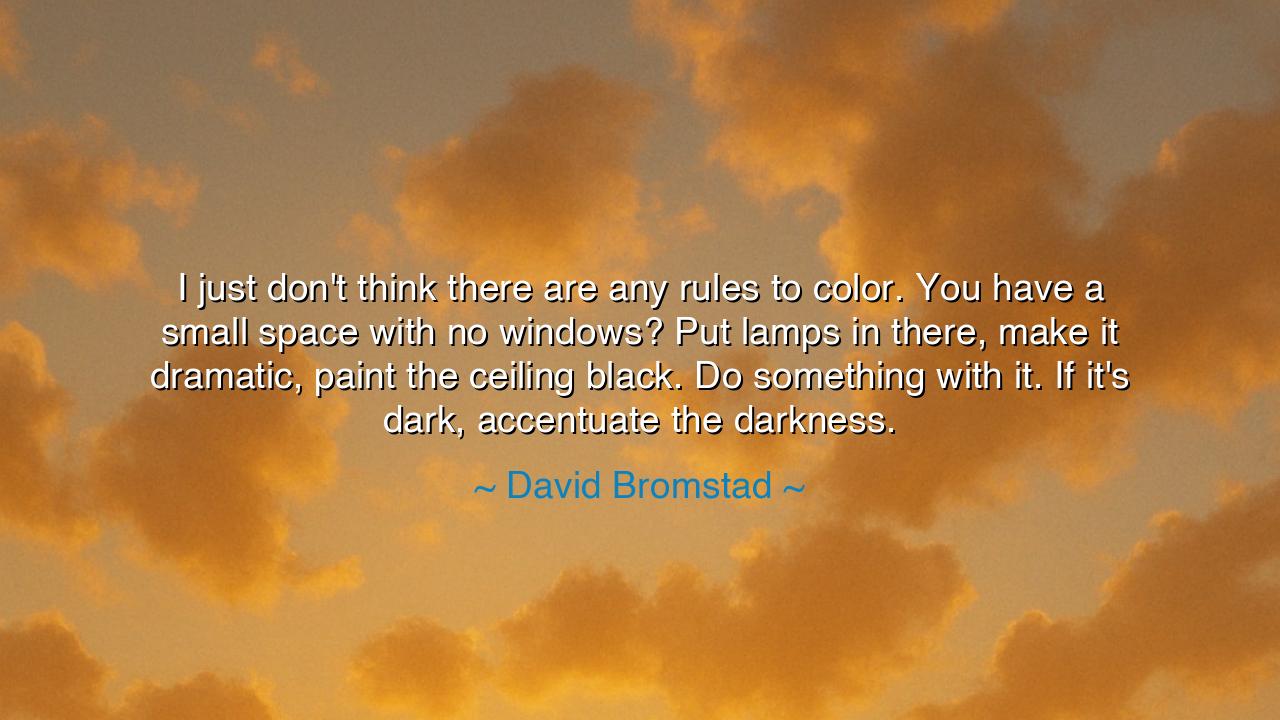
I just don't think there are any rules to color. You have a small
I just don't think there are any rules to color. You have a small space with no windows? Put lamps in there, make it dramatic, paint the ceiling black. Do something with it. If it's dark, accentuate the darkness.






Hear, O seekers of beauty and harmony, the words of David Bromstad: “I just don’t think there are any rules to color. You have a small space with no windows? Put lamps in there, make it dramatic, paint the ceiling black. Do something with it. If it’s dark, accentuate the darkness.” Though spoken of design, these words carry the fire of ancient wisdom, for they speak not only of paint and light, but of the spirit’s encounter with limitation, and the power of turning constraint into creation.
For what is color, if not the soul’s delight made visible? Many would bind it with rules, declaring what shades belong together, what spaces must be bright, what tones must be safe. But Bromstad calls us to cast aside the chains of convention. He teaches that in art, as in life, greatness is not found in timid obedience, but in bold transformation. When faced with a small space, rather than mourning its lack of grandeur, he urges us to exalt its very limits, making its intimacy into power.
This principle echoes the wisdom of the ancients. Did not the Greeks, when faced with barren stone, carve statues that breathed with divine life? Did not the Japanese, confined to narrow dwellings, transform simplicity into elegance through the art of wabi-sabi? Always, the lesson is the same: constraints are not enemies but companions, urging the soul to deeper invention. To accentuate the darkness is not surrender, but triumph—to declare that even shadow has beauty, and that the night itself may be made into sanctuary.
Consider the tale of Michelangelo, who was given a block of marble thought too flawed to carve. Others rejected it, seeing only weakness in the stone. Yet he took up his chisel and gave the world David, a form of such majesty that centuries still bow before it. He did not curse the stone’s faults; he exalted them. So too Bromstad proclaims: if your room be small, if your ceiling low, if your windows absent—do not despair. Instead, transform. Put lamps, add drama, embrace what is given until it becomes glorious.
This teaching extends beyond walls and paintbrushes, for it is the law of life itself. How often do men lament their circumstances, wishing for brighter skies, greater wealth, wider freedoms? Yet the wise know: one need not flee limitation, but can make from it a stage upon which the spirit shines more brilliantly. The darkness of hardship may be accentuated into the drama of triumph. The smallness of means may be transformed into the richness of ingenuity.
The lesson, O listener, is this: never despise your space, whether it be a room, a life, or a season of difficulty. Instead, ask: what can I make of it? If you cannot bring in sunlight, bring in lamps. If your path feels narrow, walk it with such boldness that the narrowness becomes majesty. If your days are shadowed, do not deny the darkness, but shape it into a drama that reveals your strength.
Therefore, in practice, take this wisdom to heart: stop waiting for perfection before you create. Use what is before you, embrace what seems flawed, and turn limitation into art. Let your life be as a room painted in daring color, unconstrained by rules, made radiant by imagination. In so doing, you will learn the secret that Bromstad unveils: that beauty is not the absence of darkness, but the courage to transform it into light.






AAdministratorAdministrator
Welcome, honored guests. Please leave a comment, we will respond soon